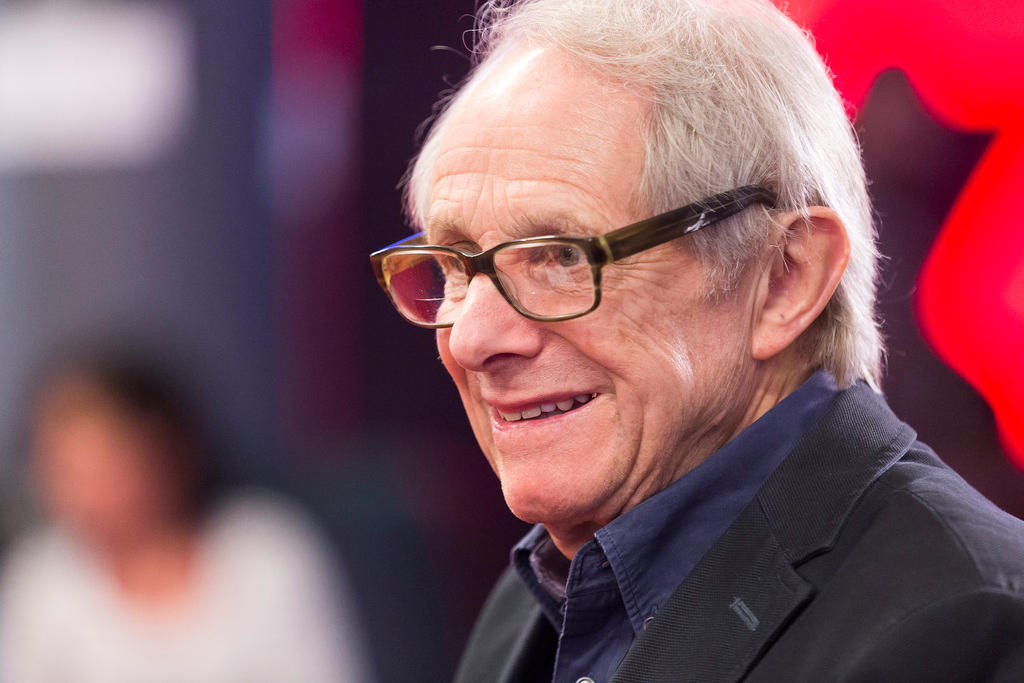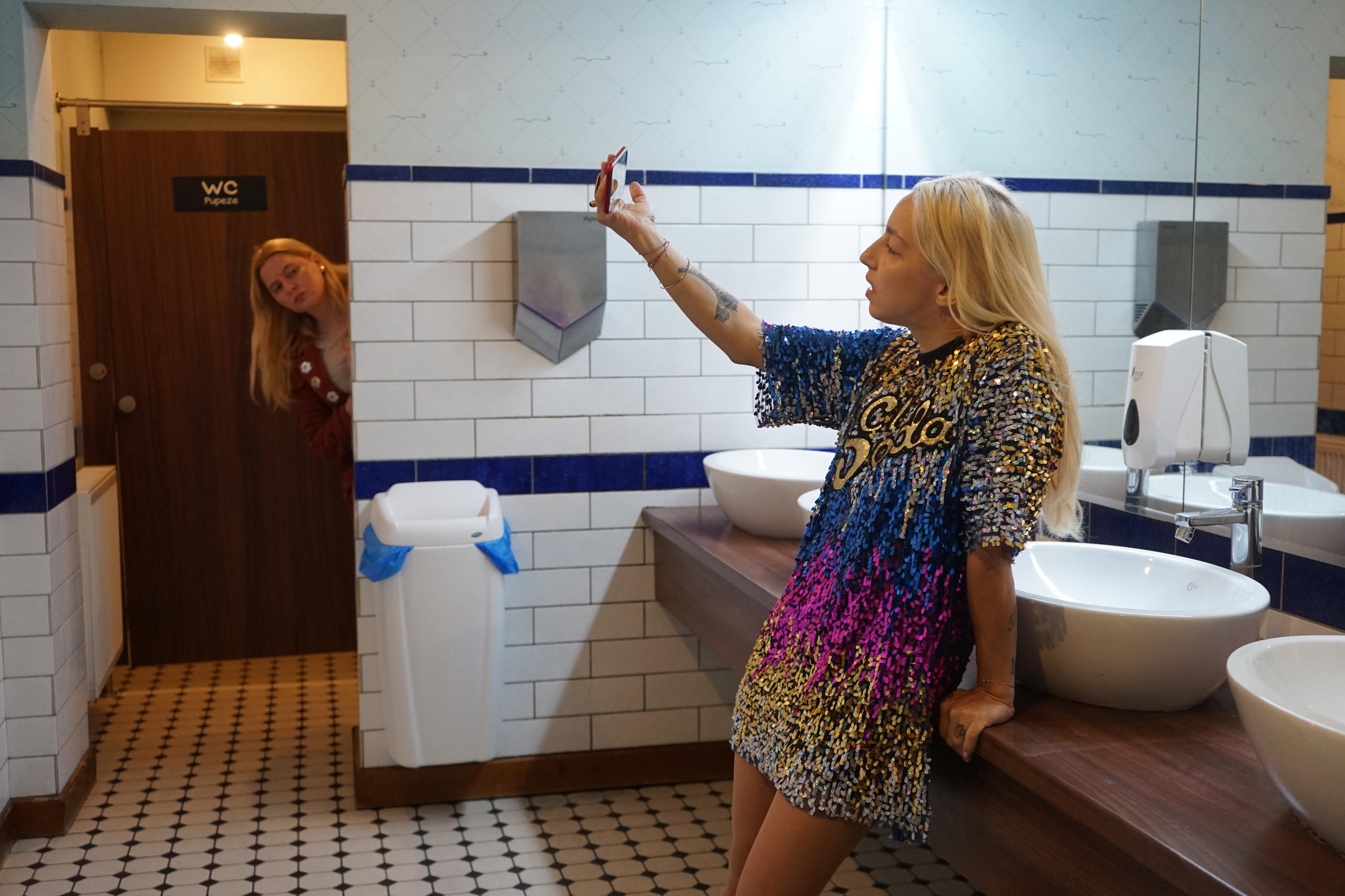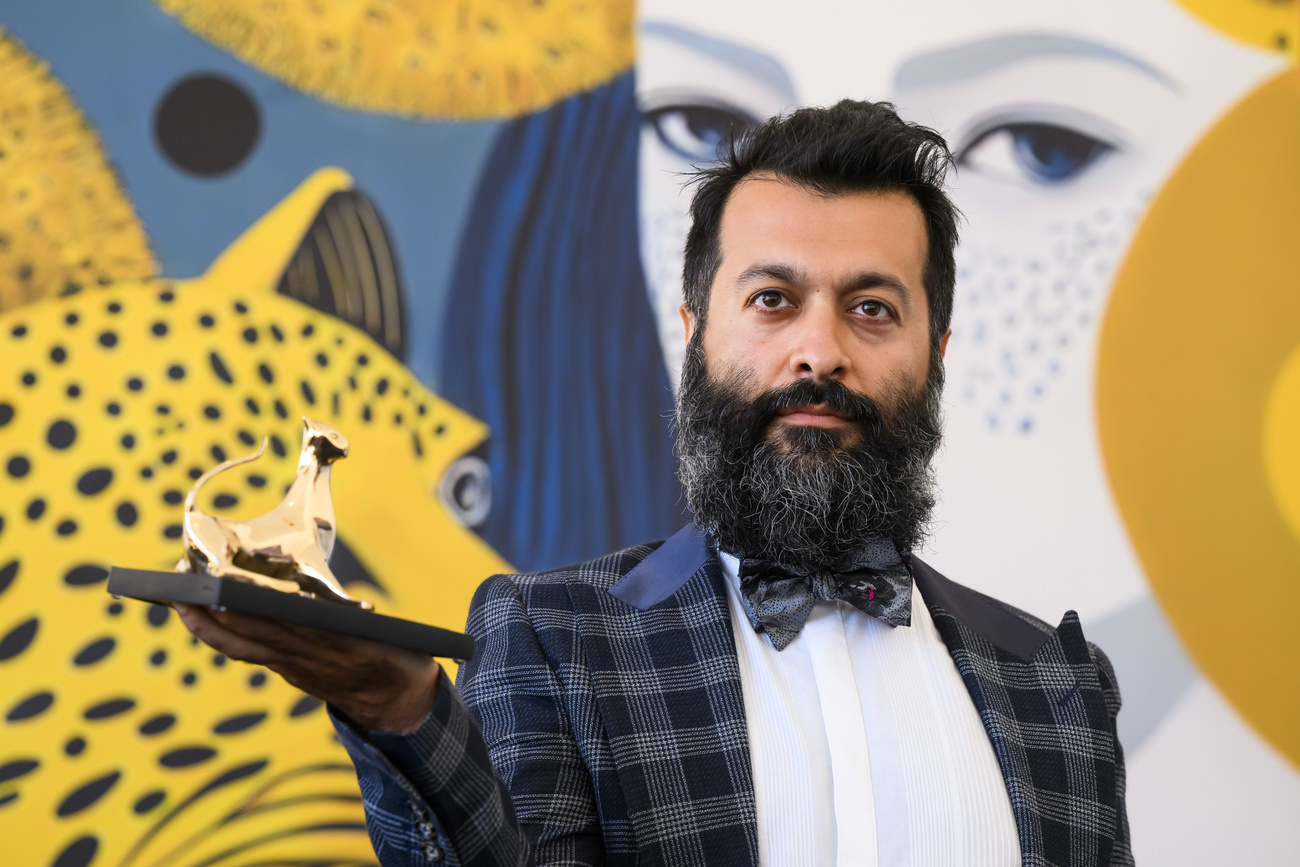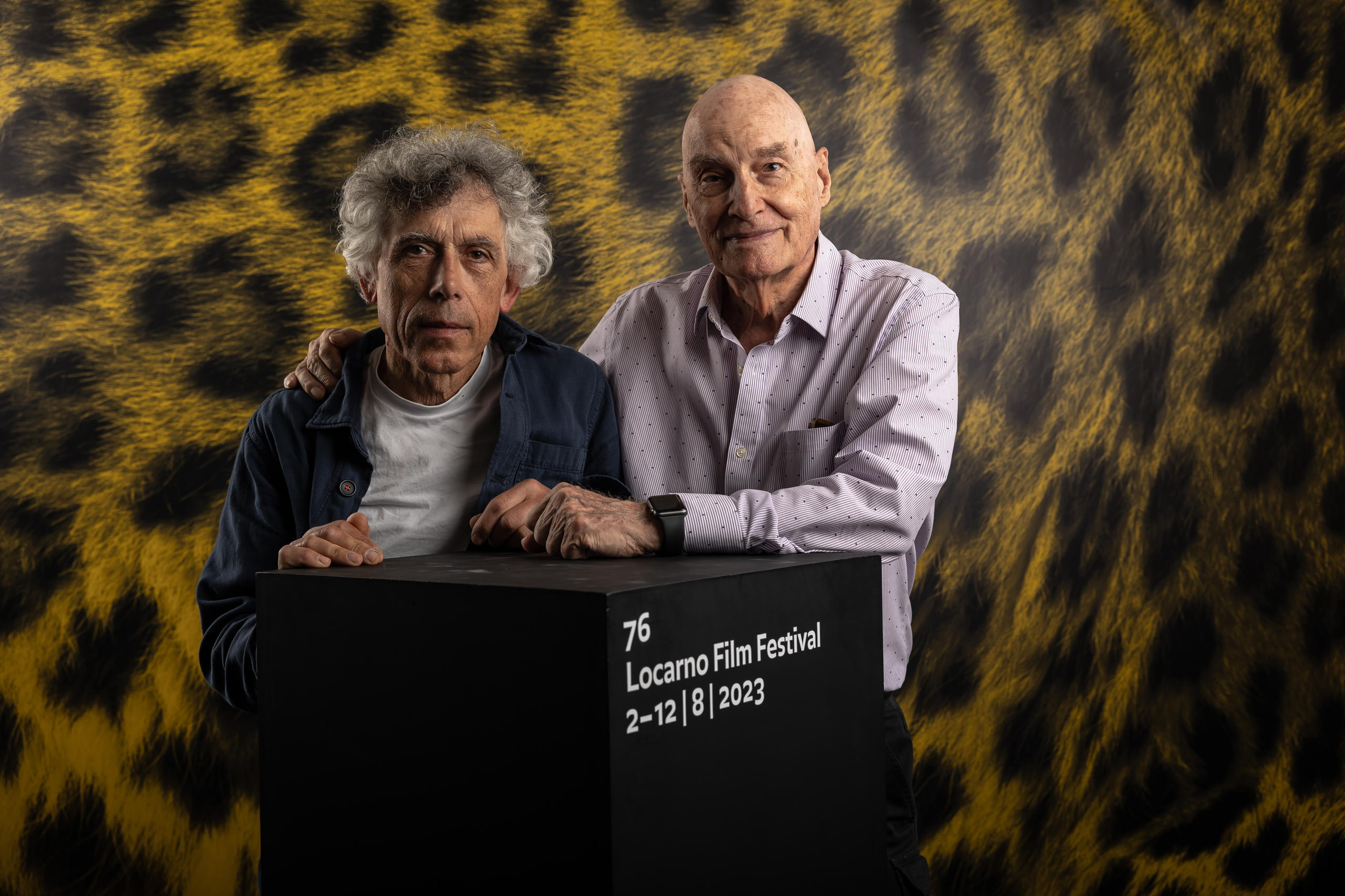Ken Loach and Paul Laverty, men of the people: ‘Hope is political’

British filmmaker Ken Loach and scriptwriter Paul Laverty received a standing ovation from the 8,000 viewers in the Piazza Grande at the Locarno Film Festival for their final film, The Old Oak. Loach and Laverty told SWI swissinfo.ch of their fears if a revolution doesn’t happen soon.
One scene in The Old Oak shows a gathering of people looking at pictures of themselves in the rundown backroom of an old pub. One Syrian refugee has taken all these pictures; she says taking photographs gives her hope. Idle moments in the street, scenes from the hairdresser’s – simple, ordinary realities you wouldn’t think are meaningful enough to make it to the screen.
Yet all these people seem to be overcome by a collective, profound happiness. Those on that backroom screen are their small lives, their neighbourhoods; it’s their gritty, hardship-stricken village.
That would be one way to describe Ken Loach’s filmography. His cinema is one of representation. It brings to the screen the stories of people the camera rarely turns its gaze to: marginalised communities, people society has turned its back on, individuals exploited by and falling through the cracks of the system. Most famously, with films sporting heavy local accents and socially proactive sentiments, Loach has been Britain’s greatest partisan director of the working class.
At 87, you’d expect Loach to have become more of a quiet, reserved presence. Yet, as he speaks, you can’t help but notice his urgent tone. He’s not just aware of the current state of the world. He is involved.
“Hope is political,” he says, in a context where right-wing movements are preying on working class anxieties all over the world. “If you have it, if you’re confident, you can make change. If that is gone, that’s when you think the world is too difficult, that the enemies are too strong. That’s when people get desperate,” he says.
“That’s when the right-wing step in. That’s when the racists come in. And then people look for easy answers. So, hope is necessary to make change. If you have no confidence, you won’t do it, you won’t organise. Politically, you need hope.”

The writer’s voice
Behind Loach’s words and images is also his screenwriter, Paul Laverty, with whom the filmmaker has collaborated since 1996. Listening to Laverty talk feels like hearing one of the characters he’s constructed. There’s a militant giddiness to him, as well. The two boast that they’ve been talking daily for 30 years about everything from life to politics and football.
“We’re like a great double act,” Laverty jokes. “I feed the lines and Ken tells the jokes.” Loach answers, humbly but with humour: “I’ll make suggestions and usually it’s not good.” But they both emphasise the importance of their shared values.
Loach has the same approach with his actors – always looking for a sense of kinship. Anyone can play a role in his films, no matter where they come from or if they have acting training or not. In fact, according to Loach, he’s very happy scouting people in local pubs on performance nights, and he’s very keen on involving people from trade. “It only matters if they are true,” Loach says.
But most importantly, both Loach and Laverty feel very wary of the political turmoil shaking many parts of the world. Evidently, they support the writers and actors strikes currently taking place in the United States.
“It always comes back to who has the power, who is in control. Big private investors will always have the power and they will always make the films they want made. We ought to be striking about the films that we’re making. The writers are treated just as in an industrial situation. And in an industry, we need a fair wage and better conditions,” Loach says.
“Why are you writing what your employers are telling you to? It all comes from it being a capitalistic enterprise. There’s always this contradiction between films: on the one hand, it’s a communication between filmmakers and the audience, on the other hand it’s a commodity between the investors and the customers. We see audiences, they see customers. We see attention, they see money.”
That has become worse with the streamers, he adds, because they are constantly looking for a magic formula. “Films should come with the diversity of a good library. But what we have is a shelf of airport novels, most of the time. Limited by the people who choose to invest.”
Unsurprisingly, Laverty agrees. “Corporations will always find faster ways to make money”, he says. “The big question now is artificial intelligence (AI) and how that will be used. I mean, it’s a fascinating tool, you can see how brilliant it is. But it’s worth asking questions about how all that knowledge that they rework is being used, or where it is taken from. [Corporations] will also find a way to privatise and monetise AI, just like they do with the data that is collected and sold now.”
Television’s glory is gone
The current shape of television is another preoccupation for Loach. He started his career doing films for television in the 1960s, but when asked how he relates to the medium now, he looks at things rather darkly, particularly at how the dynamics have changed in terms of the BBC, the British Broadcasting Corporation, as an institution of support for UK cinema.
“The BBC is an arm of the state. They offer a certain level of independence, granted that it’s not used. The BBC is an emblem of the British ruling class, which is very sophisticated, it’s very gracious, it’s prepared to laugh at itself, but it’s very ruthless,” he says.

“In the 1960s there was a rather stable economy, a more social-democratic society. There was a public ownership of services, so they were very tolerant. And I was very lucky then. They tolerated a kind of youthful dissent. There was this conviction from the managers that we couldn’t do any harm, like saying: ‘you can do what you want, and everything will stay the same’.”
Loach then expanded the scenario. “Going forward to Thatcher’s time, more things were banned so as to chase power away from the working class and trade unions. For example, during the miners’ strike they banned any mention of it except that of the violence done by the miners. So, there’s a dynamic that when such public institutions are under threat, they restrict. And when they are confident, they are tolerant,” he says.
“Now, they are not tolerant at all, because society is fragmenting. It’s a very restrictive time for people [who are working in film]. When we were working in our twenties, we got away with a lot of things we wouldn’t be able to get away with now. And the kids working now don’t get away with many things.”

The social space
As far as the future of cinema is concerned, Laverty also points out how emotional it’s been to see 8,000 people watching The Old Oak together in Locarno’s Piazza Grande, to a standing ovation.
Similarly to how the pub in the film provides an essential sense of community to the villagers, cinema is also a space of collective experience. But cinemas as physical spaces are in great peril, and so is independent cinema, warns Laverty, pointing out how Edinburgh, for example, has recently lost its famous FilmhouseExternal link.
“So many generations of students won’t have that experience of real independent cinema. So many things are under threat and we’ll have to fight to protect them. That’s also a political choice,” he says.
Yet not only cinema, but the state of the world as a whole is in peril. Asked if they still believe in revolution, Laverty wonders rather what will happen if we don’t have a revolution.
“Can you imagine what will happen in 50 years if we continue as we are? If we don’t do something, we are in serious trouble. And that’s not what we filmmakers are saying, that’s what scientists are saying – they’ve been telling us for 40 years. It was actually the scientists for BP and Shell that first warned us about what would happen – and they knew about it and did nothing. It’s criminal.”
Every so often there’s the impression that as you get older, you grow tired and abandon the fight. But Ken Loach and Paul Laverty are both still on the frontlines. Their discourse provokes an immediate, intense solidarity; what they show and speak of can be summed up very simply: they just care about people.
Edited by Eduardo Simantob

Dora Leu is a Romanian film critic and occasional filmmaker. In addition to film, she’s also studied history of art. Her main research subjects include the Japanese New Wave, essay films and experimental cinema. She has a soft spot for music videos and Irish post-punk bands.

In compliance with the JTI standards
More: SWI swissinfo.ch certified by the Journalism Trust Initiative












You can find an overview of ongoing debates with our journalists here . Please join us!
If you want to start a conversation about a topic raised in this article or want to report factual errors, email us at english@swissinfo.ch.